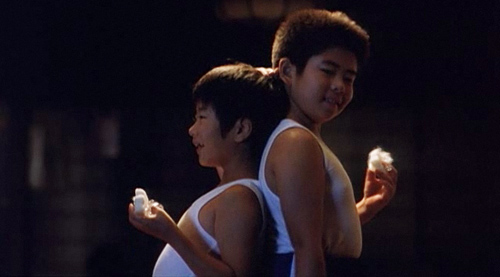David here, reporting from the final week of the London Film Festival. If there's one name guaranteed to grab my attention, it's...

The sight of Madonna's name heading up movie credits is a slightly surreal one, and it's difficult to imagine the icon standing behind a camera, and so W.E.'s worst foible is an understandable one from such a deified person. Re-edited after a poor reception at previous festivals, there is a fair deal to admire here, but all those flashbulbs must have gone to her head, because the photography is stuffed with dramatically posed shots, as if its being filmed with a still camera. Yet it's in the camera work that the film digs up shards of emotional truth amongst the narrative cliches, suggesting that Madonna might prove a worthwhile director. When the camera moves, it does so with a defiant tactility, a visual sense alive with feeling and clarity. This story of a late-'90s neglected wife (Abbie Cornish) in New York turning to the story of Wallis Simpson (Andrea Riseborough, superbly poised) for comfort and reflection is the stuff of clunky parallels with little sense of historical ambiguity. The soundtrack is alarmingly overloaded. But the immediate, reactive sense of the photography delves through the physical to the emotional roots, scoring unpredictable truths. (C) more articles on W.E.
Oslo, August 31st is like two pages ripped from a diary; one covered with words, the second blank and sodden with tears. After his first feature, the textured novelistic Reprise, director Joachim Trier follows in Louis Malle's footsteps by adapting Pierre Drieu La Rochelle's Le feu follet, a melancholy tale of a man debating suicide. Anders Danielsen Lie, one of the two leads of Reprise, is given the luxury of a film to himself ...only his character, Anders, isn't one to luxuriate. The film's first half is full of words. Anders attempts to spread his wings, testing the waters of the outside world as he breaks from a spell in rehab. A discussion with his friend Thomas (Hans Olav Brenner) stretches imperceptibly to twenty minutes, dense with completely natural musings, arguments, and agonising admissions that absorb both characters and viewers. As Anders spirals into the night, and into August 31st, the film shifts into sensory expression, the lens focus shifting lucidly, the soundtrack slowly emptying to mournful desolation. Far from easy to watch, and tearfully inconclusive, this is nonetheless another quiet triumph from Trier. (A-) more articles on Oslo August 31st
 two brothers in "I Wish"
two brothers in "I Wish"
Two brothers on a quest to repair their family. It's a story out of 1980s Hollywood cinema, and I Wish does ring with the cliches of quest narratives like Stand By Me or The Goonies. Hirokazu Kore-eda, a festival favourite thanks to films like Nobody Knows and After Life, directs this bright tale which centres around the supposed miracle that occurs when two bullet trains pass each other. Koichi and Ryu, each stuck with a parent on opposite sides of Kyushu, plot a voyage to witness the miracle and wish their family back together. Where Kore-eda betters his Stateside influences, though, is in his generous characterizations of the adult characters, who lack the intimacy we're granted with the vibrant kids but feel alive with both warmth and foibles. Inevitably, the film cycles through familiar ideas, but the wheels are so smooth it scarcely matters. The achievement of the quest isn't the thing, but the journey, and you're unlikely to find a more heartwarming, vibrant trip all year. (B+)